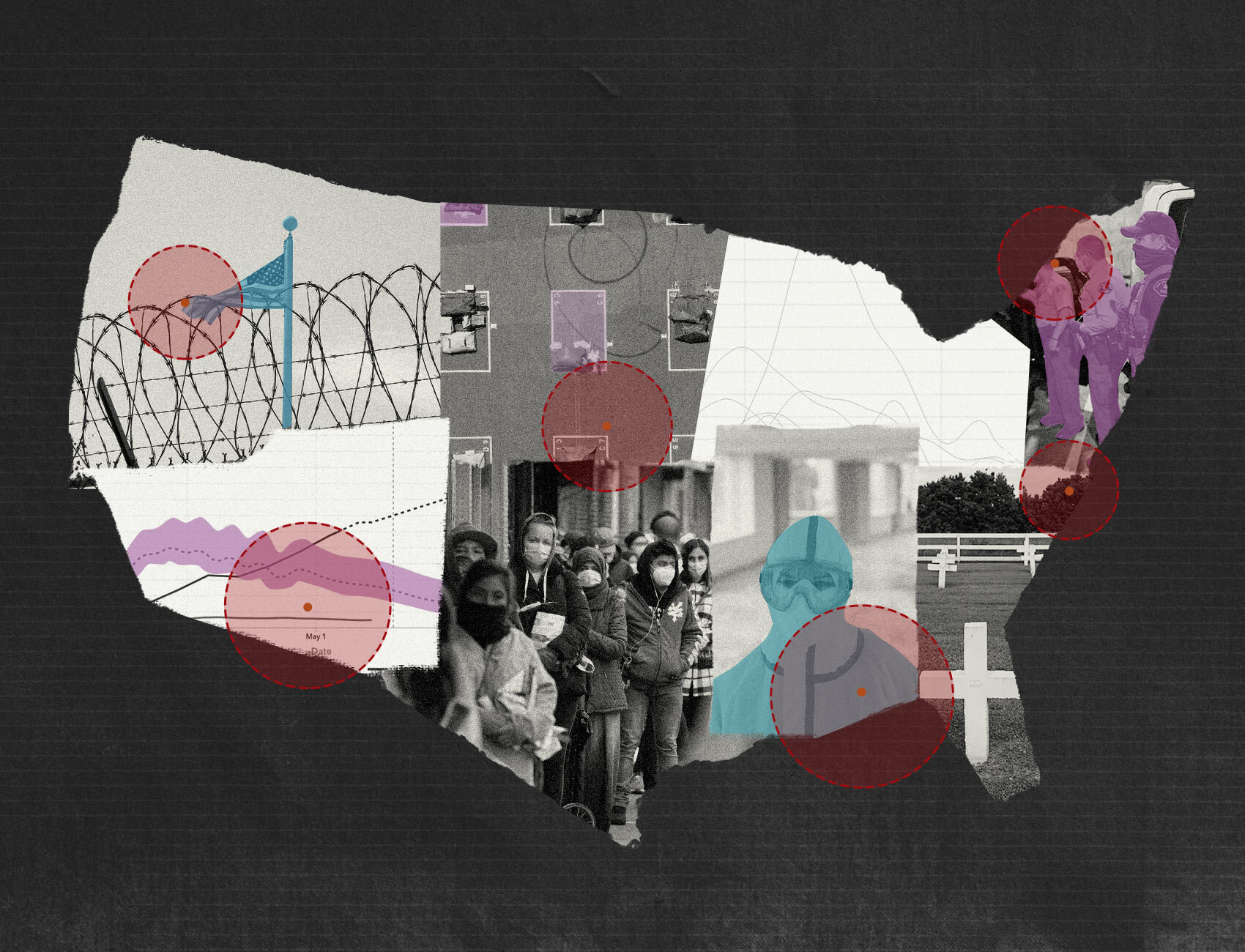Coronavirus In Jails And Prisons
California’s corrections secretary is retiring amid criticism over his handling of COVID-19 outbreaks, a Baltimore public defender describes his struggle to get an elderly client out of prison, and advocates for incarcerated people in Colorado want Gov. Jared Polis to consider more prisoner releases.

Weeks before the first reported cases of COVID-19 in prisons and jails, correctional healthcare experts warned that all the worst aspects of the U.S. criminal justice system — overcrowded, aging facilities lacking sanitary conditions and where medical care is, at best, sparse; too many older prisoners with underlying illnesses; regular flow of staff, guards, healthcare workers in and out of facilities — would leave detention facilities, and their surrounding communities, vulnerable to outbreaks. Despite those early warnings, even jails and prisons that believed they were well-prepared have seen a rapid spread of the virus. Over the next several months, The Appeal will be examining the coronavirus crisis unfolding in U.S. prisons and jails, COVID-19’s impact on surrounding communities and how the virus might reshape our lives. Read recent posts.
On Friday, California Gov. Gavin Newsom announced that Ralph Diaz, who has led the state’s corrections department since 2018, will be retiring on Oct. 1. Newsom praised Diaz’s leadership amid the “unparalleled challenges” caused by the coronavirus pandemic.
Not everyone agrees that Diaz deserves such praise. Assemblyman Marc Levine told the Los Angele Times that coronavirus outbreaks in California prisons were “a preventable public health disaster and a failure of the department’s leadership at the highest level.”
Diaz received particular scrutiny after the transfer of 121 people from the overcrowded California Institution for Men in Chino led to an outbreak at San Quentin, which ultimately infected 2,611 people and killed 26. The California Department of Corrections and Rehabilitation (CDCR) said that the prisoners were tested prior to the transfer, but many of those tests were conducted weeks earlier. In late June, a transfer of men from San Quentin to the California Correctional Center in tiny Lassen County led to another outbreak.
According to the CDCR’s case tracker, 10,634 people incarcerated in California prisons have tested positive for COVID-19 and 58 have died. The department continues to struggle to get outbreaks under control. Avenal State Prison, for example, experienced an outbreak in May that infected 804 people. A second outbreak at Avenal in late July infected another 432 people. Two weeks ago, cases at the prison were down to 128 before climbing back up to 323 over the weekend.
On Twitter, Stanford Law School Professor Mike Romano praised Newsom for selecting former CDCR Undersecretary Kathleen Allison to succeed Diaz: “She has been a warden, division director, under-secretary, and – critically – a nurse. Respected across the board and gets it done. Great move by @GavinNewsom.”
In another tweet, Romano tagged Adnan Khan, executive director of Re:Store Justice, who spent 16 years in California prisons, to get his thoughts on Allison. Khan was more circumspect.
“I don’t have too many thoughts or opinions as of now,” he told Romano. “I’m not sure what will be done different and we’ll just have to wait and see I guess.”
“Beginning of a new era,” Romano responded. “Won’t be easy to turn the ship around. But we’ll have much fewer people locked up; more humanity & genuine opportunity for those who are; and public safety will improve – all at the same time. Many moving parts but Sec Allison is an integral part of it.”
* In an essay for Slate, Todd Oppenheimer, a public defender in Baltimore, describes his struggle to get his ailing 73-year-old client out of prison. Like many incarcerated people ineligible for release, he committed a crime that the legal system defines as “violent.” But his case is complicated, Oppenheimer writes, one that “stands at the intersection of so many issues in the justice system: aging individuals in prison, victims’ rights, domestic violence, firearms, overcharging, pretrial incarceration, mandatory sentencing, parole eligibility — and now, COVID-19 running through prisons.”
* On Friday, dozens of Michigan corrections officers picketed at the entrance of the Muskegon and Brooks correctional facilities. The prisons are adjacent, but while Brooks has remained free of coronavirus, 814 people incarcerated at Muskegon—nearly two-thirds of the prison’s population—have tested positive and one has died. MLive reporter Lynn Moore writes that the picket, organized by the prison guards’ union, was to call attention to “severely understaffed” facilities that, the union says, have created unsafe working conditions.
* Irvin Haygood has remained out of prison during the coronavirus pandemic, but at a steep price—he pays $375 a month for a GPS ankle monitor, a condition of being released on house arrest. “State law generally requires a defendant to be tried within 180 days,” Baltimore Sun reporter Tim Prudente writes, “but that’s been suspended amid the virus.” With the system backlogs, it’s not clear when Haygood’s case, or the cases of the hundreds of other people in Baltimore wearing ankle monitors, will go to trial.
* Last Thursday, advocates for incarcerated people rallied on the steps of the state capitol in Denver to urge Colorado Gov. Jared Polis to release people with serious medical conditions from state prisons. In March, Polis signed an executive order giving the Department of Corrections discretion to refer medically vulnerable for parole consideration and to take other steps to “safely facilitate” a reduction in the prison population. But “fewer than 300 actually were let out before Polis allowed key parts of the order to expire in May,” reports Westword’s Conor McCormick-Cavanagh.
